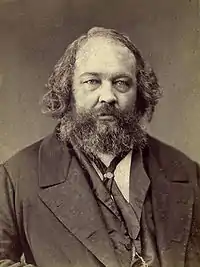Mikhail Bakunin
Mikhail Alexandrovich Bakunin[lower-alpha 1] (/bəˈkuːnɪn/;[1] 30 May [O.S. 18 May] 1814 – 1 July 1876) was a Russian anarchist and revolutionary. He became an anarchist in the 1860s, and was one of the first people in the movement. Before that he was part of the left-wing of pan-Slavism.[2] He is also known as the father of Russian nihilism.[3]
Mikhail Alexandrovich Bakunin | |
|---|---|
 Mikhail Bakunin | |
| Born | 30 May 1814 Pryamukhino, Russian Empire |
| Died | 1 July 1876 (aged 62) |
| Nationality | Russian |
| Movement |
|
History
Mikhail was born in the Russian Empire to a family of Russian nobles. As a young man he was a junior officer in the Russian army, but he quit his commission in 1835. He went to school in Moscow to study philosophy and began to attend radical groups where he was greatly influenced by Alexander Herzen. Bakunin left Russia in 1842 for Dresden, and eventually Paris where he met George Sand, Pierre-Joseph Proudhon and Karl Marx
He was eventually deported from France for speaking against Russia's oppression of Poland. In 1849 he was arrested in Dresden for being involved in the Czech rebellion of 1848. He was turned over to Russia where he was imprisoned in Peter-Paul Fortress in Saint Petersburg. He remained there until 1857, when he was sent to a work camp in Siberia. He escaped to Japan, the U.S. and finally ended up in London for a short time, then Switzerland and Italy.
In 1868, Bakunin joined the socialist International Working Men's Association, a group of trade unions and workers' organizations. A disagreement with Marx, an important person in this organization, ended with Bakunin kicked out for having a "secret organisation within the International".
The bigger Bakuninist organization lasted longer than its small Marxist rival, which was only in New York. Bakunin promoted the basic ideas of syndicalism and of anarchism. From 1870 to 1876, Bakunin wrote some of his longer writings, such as Statism and Anarchy and God and the State.
The Paris Commune fitted many elements of Bakunin's anarchist programme – self-management, mandated delegates, a militia system with elected officers, and decentralisation. Even though he was old and sick, Bakunin also tried to join anarchists in Bologna, Italy, but was forced to return to Switzerland in disguise, where he lived in Lugano. He stayed active in the worker's and peasant's movements of Europe and he also influenced movements in Egypt and Latin America.
Bibliography
- Bakunin, Mikhail Aleksandrovich (1970). God and the State. Courier Corporation. ISBN 978-0-486-22483-1.
- Bakunin on anarchism / edited, translated and with an introduction by Sam Dolgoff Mikhail Bakunin Reference Archive; preface by Paul Avrich.—New York : Knopf, originally published in 1971 as Bakunin on anarchy. Includes James Guillaume’s Bakunin—A Biographical Sketch.Michael Bakunin by James Guillaume
- Michael Bakunin: Selected Writings, ed. A. Lehning. New York: Grove Press, 1974
- Statism and Anarchy, Cambridge University Press 1991
- No Gods No Masters: An Anthology of Anarchism by Daniel Guérin
- Anarchism: A Documentary History of Libertarian Ideas, Volume 1: From Anarchy to Anarchism (300CE-1939),[4] ed. Robert Graham
- The Political Philosophy of Bakunin edited by G. P. Maximoff, including "Mikhail Bakunin—a Biographical Sketch" by Max Nettlau
- The Basic Bakunin: Writings 1869-1871, ed. Robert M. Cutler (New York: Prometheus Books, 1992)
- McLaughlin, Paul (2002). Mikhail Bakunin: The Philosophical Basis of His Theory of Anarchism. Algora Publishing. ISBN 1-892941-84-8.
Related pages
Other websites
References
- "Bakunin". Random House Kernerman Webster's College Dictionary. 2010.
- Bakunin's idea of revolution and anarchist revolutionary organisation, Struggle.ws, retrieved 2009-09-08
- "Bakunin, Mikhail". Terrorism Reference Library. Cengage. Retrieved September 18, 2020 – via Encyclopedia.com.
- "Table of Contents". Archived from the original on 2008-09-29. Retrieved 2008-10-12.
- Russian: Михаи́л Алекса́ндрович Баку́нин, IPA: [mʲɪxɐˈil ɐlʲɪkʲsɐnʲtrəˈfit͡ɕ bɐˈkunʲɪn]